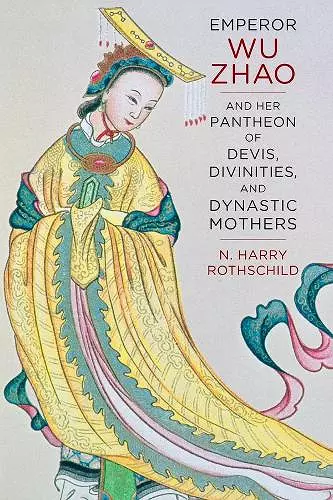Emperor Wu Zhao and Her Pantheon of Devis, Divinities, and Dynastic Mothers
Format:Paperback
Publisher:Columbia University Press
Published:9th Jan '18
Currently unavailable, our supplier has not provided us a restock date

Wu Zhao (624-705), better known as Wu Zetian or Empress Wu, is the only woman to have ruled China as emperor over the course of its 5,000-year history. How did she-in a predominantly patriarchal and androcentric society-ascend the dragon throne? Exploring a mystery that has confounded scholars for centuries, this multifaceted history suggests that China's rich pantheon of female divinities and eminent women played an integral part in the construction of Wu Zhao's sovereignty. Her strategy, Rothschild shows, is proof that medieval Chinese women enjoyed a more complex social status than previously known.
Wu Zhao (624–705), better known as Wu Zetian or Empress Wu, is the only woman to have ruled China as emperor. How did she ascend the dragon throne? This multifaceted history suggests that China's rich pantheon of female divinities and eminent women played an integral part in the construction of Wu Zhao's sovereignty.Wu Zhao (624-705), better known as Wu Zetian or Empress Wu, is the only woman to have ruled China as emperor over the course of its 5,000-year history. How did she-in a predominantly patriarchal and androcentric society-ascend the dragon throne? Exploring a mystery that has confounded scholars for centuries, this multifaceted history suggests that China's rich pantheon of female divinities and eminent women played an integral part in the construction of Wu Zhao's sovereignty. Wu Zhao deftly deployed language, symbol, and ideology to harness the cultural resonance, maternal force, divine energy, and historical weight of Buddhist devis, Confucian exemplars, Daoist immortals, and mythic goddesses, establishing legitimacy within and beyond the confines of Confucian ideology. Tapping into powerful subterranean reservoirs of female power, Wu Zhao built a pantheon of female divinities carefully calibrated to meet her needs at court. Her pageant was promoted in scripted rhetoric, reinforced through poetry, celebrated in theatrical productions, and inscribed on steles. Rendered with deft political acumen and aesthetic flair, these affiliations significantly enhanced Wu Zhao's authority and cast her as the human vessel through which the pantheon's divine energy flowed. Her strategy is a model of political brilliance and proof that medieval Chinese women enjoyed a more complex social status than previously known.
This is a fascinating study of the only female emperor in the whole of Chinese history. By delving deeply into the religious underpinnings of Wu Zetian's power in a way that not even the most dedicated approach to her utilization of Buddhist scriptures and doctrines alone could manage, this investigation illuminates the unique quality of Wu Zetian's reign far more effectively than previous studies. Emperor Wu Zhao and Her Pantheon of Devis, Divinities, and Dynastic Mothers is a solid piece of well-documented scholarship, yet it is vibrant and entertaining throughout. -- Victor H. Mair, University of Pennsylvania Wu Zhao is one of world history's most fascinating figures and the most powerful woman in China's long past. N. Harry Rothschild sheds new light on the ideological underpinnings of Wu Zhao's rise to power and unprecedented female dynasty. The Buddhist prophecies justifying her rule are well known, but Rothschild uncovers a more complex story that includes wise mothers and potent goddesses drawn from the Confucian, Daoist, and Buddhist traditions. In lively prose, Rothschild reveals an ever-evolving pantheon of female paragons that Wu Zhao deployed strategically before and after claiming the throne. -- Jonathan Karam Skaff, author of Sui-Tang China and Its Turko-Mongol Neighbors With painstaking research, unerring insights, rich prose, and a sense of humor, Rothschild lavishly illustrates the political genius of Wu Zhao, China's only female emperor. Indicating her keen political instincts and expansive knowledge of China's cultural traditions, Rothschild adeptly delineates how, over the span of her fifty-year rule, Wu Zhao selectively made use of different goddesses and heroines to match the specific circumstances of her career's twists and turns. -- Keith N. Knapp, The Citadel, The Military College of South Carolina This book is a tour de force of textual analysis and historical detective work that leaves previous sensationalistic accounts of Wu Zhao's rise to power in the dust. -- Suzanne Cahill, University of California, San Diego Exhaustively researched... Tricycle What an original and remarkable story N. Harry Rothschild tells-of ancestors, power, and leadership. How a woman in an ancient, male-dominated culture employed art and poetry, history and mythology, and ritual and violence to create an ancestral line that consolidated her own gender-bending authority; the story of how Empress Wu invented herself as China's sole female ruler, the Emperor Wu Zhao. -- Doris Kearns Goodwin, author of The Bully Pulpit: Theodore Roosevelt, William Howard Taft, and the Golden Age of Journalism A lively and captivating narrative that is sure to please both specialist and student alike... Rothschild deserves tremendous applause. Studies in Chinese Religions Highly revealing... The amount of material that has been drawn upon to achieve this result is impressive. International Journal of Asian Studies [An] informative and entertaining excursion into the religio-political machinations of perhaps the most (in)famous woman in Chinese history. -- Stuart H. Young Religious Studies Review
ISBN: 9780231169394
Dimensions: unknown
Weight: unknown
384 pages